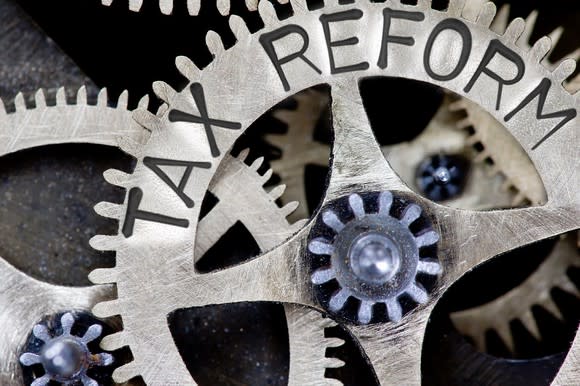Will Your School Pay This New Trump Tax?
The tax reform laws largely centered on tax cuts. Between the huge reductions in the corporate tax rate and the smaller yet still significant drops in the rates on tax brackets for individual taxpayers, the Trump administration stressed the idea that most taxpayers would pay less in tax.
One little-noticed provision of the new tax laws, though, imposed a brand-new tax on a select set of taxpayers. It'll only affect a few dozen entities, but if the provision survives, it would mark a new era for some of the most prestigious educational institutions in the nation.
Why your school could have to pay a new tax
Toward the end of the Tax Cuts and Jobs Act, a provision added a new excise tax based on the investment income of private colleges and universities. Most institutions of higher education are tax exempt under Section 501(c)(3) of the Internal Revenue Code, which not only prevents them from having to pay taxes on their income but also allows donations from alumni and other charitably minded donors to be tax deductible.

Image source: Getty Images.
Specifically, the new provision imposes a 1.4% tax on the net investment income of any private college or university that meets the qualifying criteria. The tax applies only to schools that had at least 500 students and in which more than 50% of students are located within U.S. borders. Most importantly, the tax applies only to schools that have assets exceeding $500,000 multiplied by the number of students attending the school. The provision specifically excludes state colleges and universities.
Because of the asset test, only a small number of educational institutions will be subject to the tax. However, the names of those affected are among the most prestigious in the nation, including Ivy League members Harvard, Yale, Princeton, and Dartmouth; tech giants Stanford, Caltech, and MIT; and top New England liberal arts colleges including Williams, Amherst, and Bowdoin.
How colleges and universities want to school the IRS
The schools that will have to pay the new tax have already looked for ways to fight back. Some have argued that the way in which the tax was structured is unconstitutional as an attempt to curb what some tax reform proponents might see as inappropriate exercise of academic freedoms. Others are looking at ways to restructure their assets in order to minimize or eliminate any tax liability from the measure. For instance, assets that are used directly toward the educational purpose of the college or university -- such as classroom buildings, for example -- aren't intended to be included in assets for purposes of calculating per-student figures. To the extent that educational institutions can recharacterize assets, it could reduce tax liability.
The IRS itself also appears to be providing some relief from the prospective tax. In a news release in June, the tax agency said it would likely treat as net investment income only those capital gains that relate to the period in which the tax was in force. In other words, rather than using the actual tax basis of investment assets dating back to whenever a college endowment purchased them, the IRS would measure gain only on the change between the proceeds of sale and the fair market value as of the end of 2017. This stepped-up basis rule, similar to the treatment heirs to an estate get on the property they inherit, will typically reduce substantially the gain subject to the tax.
Will the new tax get repealed?
Public opinion on the tax varies, and age plays a key role. Those who are well out of college are more likely to believe that endowments should be free of tax. Those who are still in school or are recent graduates, on the other hand, are more likely to argue that endowments should get taxed -- perhaps in an effort to get schools to spend more money on supporting their students directly through reduced tuition and other financial assistance. Yet the schools themselves note that money that goes toward paying a tax means less in financial resources for their current needs.
Efforts to repeal the tax are likely to continue, and with plenty of political power, the educational institutions in question will put up a tough fight. For now, though, the colleges and universities that are potentially subject to the tax will need to plan on coming up with money to pay their first tax bill shortly after 2018 ends.
More From The Motley Fool
The Motley Fool has a disclosure policy.

 Yahoo Finance
Yahoo Finance 